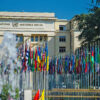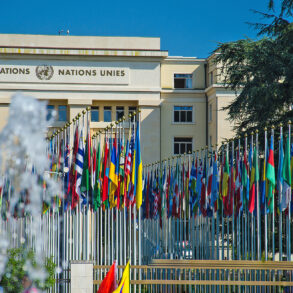Larnaka (KNA) – The Hala Sultan Tekke lies on the Salt Lake of the same name southwest of Larnaka, is a tomb, mosque, and pilgrimage destination at the same time – and one of the most important pilgrimage sites in Islam.
Photo: Pxhere, com
It is located in the Republic of Cyprus, which, unlike the “Turkish Republic of Northern Cyprus,” is recognised under international law. For Alemdar, who as representative of the Cypriot Mufti is responsible for the mosques in the southern part of Cyprus, the site is also “a fantastic opportunity to promote peaceful coexistence”, he says in an interview with the Catholic News Agency at his official residence. By Andrea Krogmann
Question: Mr Alemdar, why is the Hala Sultan Tekke so important?
Imam Shakir Alemdar: The importance of the Hala Sultan Tekke comes from Umm Haram, the Prophet Muhammad’s wet nurse, who is buried here at this site. The Prophet initiated her into his vision of spreading the word of God to the world and she asked him to join the expeditions. At this spot she fell off her horse, died and was buried here.
Muslims have venerated this place ever since, and it has never been lost in the course of history. For example, it is mentioned in historical travel books. In Ottoman times, the site was developed. Tekke means monastery, a place of worship with accommodation, in this case perhaps also with infirmaries and facilities for religious education. Charity societies were set up for them, through which generous donations were received.
With the political conflict and partition of the island, the Hala Sultan Tekke was not accessible to Muslims from 1974 to 2003 and fell into disrepair. After a USAID-funded repair in 2008, the community began to slowly come back – and we started to bring back a routine, for example at prayers. A lot of believers come to the Friday prayers. We cook for them, with donated food – you don’t find that in many other mosques. At the same time, the site is still not completely under our management. We are bound to the opening hours and cannot work full time. We hope that this will change in the future. We still feel the abnormality that the division of the island brings.
Question: The Hala Sultan Tekke is also “abnormal” in a positive sense.
Imam Shakir Alemdar: Since the early days, the place was also visited by non-Muslims. It is still a shining example of good interfaith coexistence and is visited by non-Muslim groups and also the religious leaders of other religions with whom we have close relations. So, the Hala Sultan Tekke is a fantastic opportunity to promote peaceful coexistence.
Question: This is also the concern of the initiative “Religious Track of the Cyprus Peace Process.”
Imam Shakir Alemdar: The Religious Track, the process of bringing religions together in Cyprus, is a very helpful tool because it brings people together. It brings leaders of Christian denominations and Muslims around the table. We listen to each other with the heart of the believer, without bringing politics or conflict into it. All parties benefit from this. Cyprus has a good record of living together. We have a centuries-long history of good neighborliness and mutual concern, but we needed this initiative as a reminder of that. It brings back good memories and at the same time reminds us that the welfare of Cyprus is our first duty.
Cyprus, with its rich Muslim heritage, is unique in Europe. Cyprus knows no Islamophobia because Cypriots have seen the true face of Islam. I hope that our work in the Religious Track, which is a work for humanity, will develop and be reflected in appropriate practice. It is necessary that we learn to live together, Muslims with non-Muslims, Christians with non-Christians. The Religious Track has brought many positive changes in this regard. We show that religious leaders act like one family and without rivalries.
Question: What role does religion play in the Cyprus conflict?
Imam Shakir Alemdar: Religion is a victim of the conflict, not its cause! Let’s take the example of places of worship of the other side: they are not in the hands of the religious communities, but of political authorities. Politicians and civil servants, in turn, do not care much. That is why we need education for a better understanding. The enmity must end.
Question: How many mosques are there in the southern part of the island today?
Imam Shakir Alemdar: About one hundred, but only eight are used. That is not enough for our community. We need more mosques and more cemeteries, especially if you consider the number of refugees from Muslim countries. There is an urgent need. There is a lack of places for ritual ablutions, there is a lack of rooms for women, our facilities need to become barrier-free. I want our mosques to be run in a civilised way, just as I point out to people who are new to us that they are in Europe and must have a European attitude. We are aware of the shortcomings and the problem could be fixed quickly, but unfortunately the authorities are very slow in understanding. The same applies to Christian sites in the northern part of the island. The prevailing situation is, among other things, the cause of critical reports on religious freedom in Cyprus.
Question: What is your community like?
Imam Shakir Alemdar: We are about 30,000 Muslims in the southern part of Cyprus. They are made up very colourfully of Turkish Cypriots, migrant workers, refugees. They are Arabs, Asians, Europeans. I give my sermon for the Friday prayers in English. Incidentally, my sermons are never political, but are about the purest Islamic teachings: the common good, our responsibility towards the Creator, people, nature.











